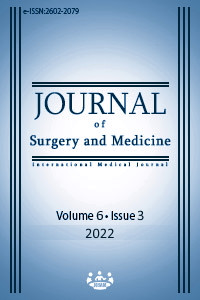Do women living in northeast Anatolia get mammography screening? A hospital-focused cross-sectional study
Keywords:
Mammography, Breast, Breast cancer, Risk Factor, General SurgeryAbstract
Background/Aim: In Turkey, women between 40–69 years of age are routinely subjected to mammography screening for breast cancer. Despite this, the mammography rate is only 28.9% in women aged 15 years and above. This is an indication that women in Turkey are not sufficiently interested in mammography screenings. This study aimed to determine the factors that affect the decision to not have mammography screening for women aged 40 and above. Methods: The study was designed as a hospital-focused cross-sectional study. The population of the study comprised 7,239 women aged 40 years and above. The sample size that would represent the population was calculated as 365 women with 50% prevalence, 95% confidence interval, and 5% deviation in the Epi Info program. A Chi-square test used in the binary analysis (P<0.05 was considered statistically significant); and backward LR logistic regression analysis was used in multiple analyses. Results: Based on the findings of the study, 57.0% of women did not have mammography screening. This was 2.047 times (CI: 2.341–5.841) higher among those living in rural areas when compared with women living in the city/district center, 2.639 times (CI: 1.291–3.247) higher in women with eight years or less of education as compared with those who had nine or more years of education, and 1.9 times (CI: 1.172–3.081) higher in women not informed by family doctor/family health staff (AH/ASE) when compared with women receiving information. Conclusion: The percentage of mammography screening is low in women over the age of 40. The risk factors were determined to be low education, rural areas of residence, and a lack of information provided by the family doctor.
Downloads
References
Health Statistics Yearbook 2018 (https://dosyasb.saglik.gov.tr/Eklenti/36134,siy2018trpdf.pdf?0) access date 19.04.2021)
World Health Organization (2002). National Cancer Control Programs Policies and Managerial Guidelines, 2nd Edition, Geneva.
Lenchner L, De Nooijer J, De Vries H. Breast self-examination: longitudinal predictors of intention and subsequent behavior. Eur J Cancer Prev. 2004;13(5):369-76. doi: 10.1097/00008469-200410000-00003.
Ministry of Health, General Directorate of Public Health, Cancer Department (https://hsgm.saglik.gov.tr/tr/kanser-tarama-standartlari/listesi/meme-kanseri-tarama-program%C4%B1-ulusal-standartlar%C4%B1.html) access date 19.04.2021)
Health Statistics Yearbook 2019 (https://dosyasb.saglik.gov.tr/Eklenti/40564,saglik-istatistikleri-yilligi-2019pdf.pdf?0) access date 19.04.2021)
Gozum S, Tuzcu A, Muslu L, Aydemir K, Ilgaz A, Akgoz AD, et al. Risk prevalence for some non-communicable diseases in adult individuals living in rural areas. Cukurova Med J. 2020;45(1):157-69. doi: 10.17826/cumj.632153.
Sacıkara Z, Tanyer DK. Participation and knowledge of rural women in cervical and breast cancer screenings. Sted. 2021;30(1):43-52.
Acıkgoz A, Cehreli R, Ellidokuz H. Women's knowledge and attitudes towards cancer and their behavior towards early diagnosis methods. DEU Medical Journal. 2021;25(3):145-54.
Ozaydİn AN, Gulluoglu BM, Unalan PC, Gorpe S, Cabioglu N, Oner BR, et al. Breast cancer knowledge levels, information resources and breast health practices of women living in Bahçeşehir. J Breast Health. 2009;5(4):214-24.
Çevik C, Güneş S, Hattatoğlu TD, Seller MA, Bulut B, Şahin SC, et al. The knowledge, attitude and behavior of women aged 40-60 on early detection of breast cancer. JFMPC. 2019; 13(2):119-28. doi: 10.21763/tjfmpc.569469.
Catak B, Oner C. Sociocultural factors affecting unplanned deliveries at home: a community-based case control study. Soc Work in Public Health. 2015;30(7):535-44. doi: 10.1080/19371918.2015.1063101.
Silva TB, Mauad EC, Carvalho AL, Jacobs LA, Shulman LN. Difficulties in implementing an organized screening program for breast cancer in Brazil with emphasis on diagnostic methods. Rural Remote Health. 2013;13(2):1-11.
Gabrysch S, Campbell OM. Still too far to walk: Literature review of the determinants of delivery service use. BMC Pregnancy Childbirth. 2009;9(34):2-18. doi: 10.1186/1471-2393-9-34.
Catak B, Oner C, Sutlu S, Kilinc S. Effect of socio-cultural factors on spontaneous abortion in Burdur, Turkey: A population based case-control study. Pak J Med Sci. 2016;32(5):1257-62. doi: 10.12669/pjms.325.10078.
Dişçigil G, Şensoy N, Tekin N, Söylemez A. Breast health: Knowledge, behavior and practices of a group of women living in the Aegean region. Marmara Medical Journal. 2007;20(1):29-36.
Koçyiğit O, Erel S, Kısmet K, Kılıçoğlu B, Sabuncuoğlu MZ, Akku MA. The level of knowledge of women who applied to the polyclinic about breast cancer, breast examination and mammography: a study conducted in the city center. Nobel Med. 2011;7(2):19-25.
Downloads
- 405 483
Published
Issue
Section
How to Cite
License
Copyright (c) 2022 Turgut Anuk, Hasan Çantay
This work is licensed under a Creative Commons Attribution-NonCommercial-NoDerivatives 4.0 International License.
















